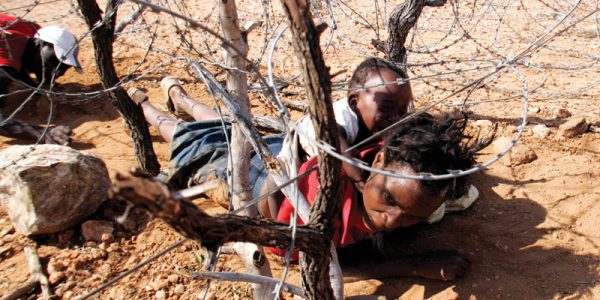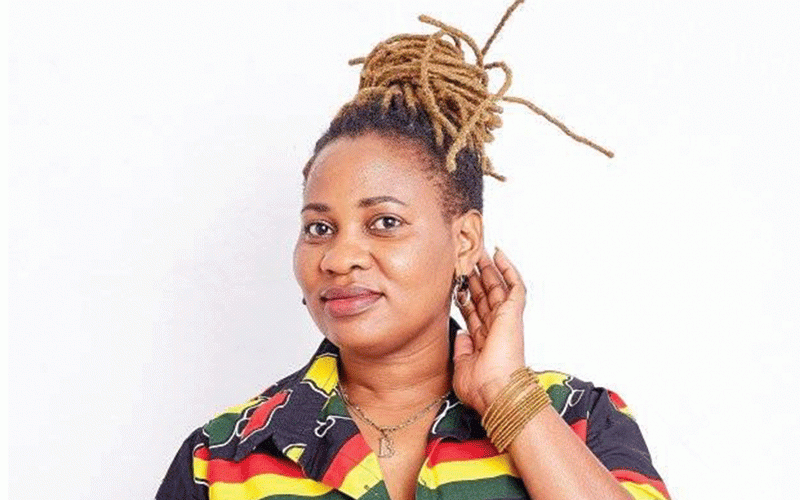
____________________________________________________________________________ SPECIAL REPORT BY ANDREW KUNAMBURA

Some passengers position themselves at the otherwise sleep-compatible backseat, but suffer a backlash from the conductor who denies them the chance for unclear reasons. As the clock ticks towards the 10th hour, the bus finally takes off.
Somewhere along the way, the bus pulls off the road when a crew member sprints into a thicket, returning with six shabbily-dressed men who board the bus and file straight to the back seats. And just before reaching the border post, the six men disembark with their two keepers and dash into the darkness.
Stories about human trafficking often appear to be fictitious Western-style movie material set in far-away places like cities in Mexico, Argentina, Pakistan, small towns in countries across the seas like Vietnam or rural parts of Cuba, but it in reality happens in cities, towns and villages all over the world.
Zimbabwe is apparently deeply involved in the criminal activity.
- Chamisa under fire over US$120K donation
- Mavhunga puts DeMbare into Chibuku quarterfinals
- Pension funds bet on Cabora Bassa oilfields
- Councils defy govt fire tender directive
Keep Reading
 The United Nations Convention against Transnational Organised Crime, commonly known as the Palermo Protocol, defines human trafficking as “the recruitment, transportation, transfer, harbouring or receipt of persons, by means of threat or use of force or other means of coercion, of abduction, of fraud, of deception, of the abuse of power or of a position of vulnerability for purposes of exploitation”.
The United Nations Convention against Transnational Organised Crime, commonly known as the Palermo Protocol, defines human trafficking as “the recruitment, transportation, transfer, harbouring or receipt of persons, by means of threat or use of force or other means of coercion, of abduction, of fraud, of deception, of the abuse of power or of a position of vulnerability for purposes of exploitation”.
Adopted by the United Nations General Assembly in 2000, the protocol states prostitution, sexual abuse, forced labour or services, slavery, servitude or the ritual removal of organs as the major forms of exploitation victims are subjected to.
Zimbabwe’s young women, men and children are being trafficked at an alarming rate to other countries where they are forced to work as sex slaves in brothels or give slave labour in factories, mines, farms and other businesses.

Tempted by needs, hopes and dreams, victims encounter their traders who in turn are driven by profit, the need to possess and a will to deceive, exploit and violate laws.
Minors are also being trafficked for ritual purposes and domestic servitude.
TRAFFICKING NETWORKS TARGET YOUTHSInternational Organisation for Migration (IOM) chief of mission Martin Ocaga confirmed that human trafficking was rampant in Zimbabwe saying that the southern districts are the most affected due to high migrations.
IOM is an international humanitarian organisation whose main mandate is to ensure orderly and humane management of migration and promotion of international co-operation on migration issues.
“People are being trafficked mainly from high-migrant districts like Gwanda, Mberengwa and other southern districts of the country,” Ocaga said.The IOM chief said young women and men are vulnerable to human traffickers because these people are desperately looking for ways and means of earning income.
“The few opportunities at home make migration a natural and common solution. South Africa, because of its appealing allure and as a historical magnet for job seekers, aided by its porous borders, makes it the most obvious destination for migrants. Its flourishing sex industry makes it an obvious target for traffickers,” he said.
Ocaga said most victims are girls and young women aged between 14-24 who are promised lucrative employment or education opportunities in South Africa or overseas.
“Once they arrive at their destinations they are either sold on private order to female bosses of prostitution rings or rented out to brothels earning the trafficker huge sums of money through sleeping with different men,” he said.Ocaga described human trafficking as “submarine crime”, saying traffickers operate in byzantine syndicates that develop vast networks in government and corporate circles and at borders with huge sums of money involved.
This, he said, enables them to smoothly move their victims from country to country.
“There are several syndicates that operate on a global scale to traffic people. They use the huge amounts of money raked in the illicit business to create powerful networks around the world.“These include various West African Nigerian networks, Chinese Triad Societies and the Bulgarian/Russian Mafia who manage vast trafficking empires,” Ocaga said.
ZIMBABWE A MAJOR TRANSIT ROUTE
Zimbabwe has since become a major transit route for human trafficking for people from Somalia and Ethiopia. But the Democratic Republic of Congo has also joined these countries in human trafficking owing to the internal conflicts.
Zimbabwe ratified the Palermo Protocol on December 13 last year marking the first real attempt to combat the crime before President Robert Mugabe invoked the Presidential Powers (Temporary Measures) Act to gazette the Anti-Trafficking in Persons Act — a new anti-human trafficking statute designed to help fight the crime as a proper Act of Parliament is put in place.

The government has since gazetted the Anti-Human Trafficking Bill which is expected to pass through Parliament before the 180-day life span of the statutory measure comes to an end.
The new statutory measure which was pronounced hardly a month ago has since resulted in the arrest of four alleged human traffickers.
ARRESTS MADE- A Harare-based woman was arrested in early February for allegedly recruiting 22 young Zimbabwean women for purported employment as housemaids in Saudi Arabia.
The local women aged 22-24 responded to the advertisement she had placed on an online classifieds website and travel preparations were in progress when she was arrested.
- Another, a 62-year-old Harare woman was arrested a few weeks later and has appeared in court charged with human trafficking after she allegedly recruited two local women into prostitution in Angola.
Allegations are that she recruited the women by misrepresenting that they would be working for her, but on arrival in Angola, she confiscated their passports and cellphones and forced them to have unprotected sex with several men while she collected money from these clients.
- Recently police arrested a Harare woman who lured two minor girls to her apartment St Martin’s where she made them sleep with men for a fee. She would in turn give the girls a little portion of the payment to buy their silence.
IOM counter trafficking officer Tapfuma Kusemwa said traffickers were taking advantage of the absence of legislation against the crime; a situation he said would be addressed by the recently gazetted Human Trafficking Bill.
“This Bill is the most effective intervention in Zimbabwe to combat human trafficking. It defines the crime in all its forms, empowers the law enforcement agencies, provides for victim protection and rehabilitation and clearly spells out the aggravating factors necessary for successful prosecution of offenders,” he added. IMMIGRATION ACT LAST UPDATED 1997Legal expert Advocate Tonderai Bhatasara of Mupanga Bhatasara Legal Practitioners urged Parliament to speed up passage of the Bill saying it was long overdue.
“It doesn’t reflect positively that we are this late to legislate to combat a serious offence like trafficking in humans. Before the law, perpetrators, if any, would be charged with kidnapping, false imprisonment, abduction, extortion and fraud.“However, these laws were not best suited to deal with a complicated and at times extra-territorial cases of human trafficking,” he said.
“The Immigration Act, which itself was last updated in 1997, is clearly a law about the movement of people across borders. Its punishments are not very deterrent and therefore were not the right tool to deal with human trafficking cases,” he added.
Assistant regional immigration registrar Francis Mabika confirmed that irregular migration was extensive saying it was most prevalent in border towns like Beitbridge, Chirundu, Nyamapanda and Forbes border posts.
“We have had perennial problems at the border areas which undocumented migrants, both Zimbabwean and alien, use to gain access in and out of the country. It is, however, difficult to ascertain a general migrant from a human trafficking victim or perpetrator,” he said.While traffickers use mostly the illegal crossing points, they sometimes move their undocumented victims through the legal ports using money to bribe border control officials.
“Zimbabwe’s immigration manages formal entry/exit points and relies on key stakeholders who patrol border lines such as police and in such cases, allegations of corruption can always rise, but we have credible cross pre-border clearance, port of entry profiling and inland checks and systems which, although not waterproof, are a deterrent to this form of organised crime” Mabika said. Beitbridge, being Zimbabwe’s biggest port of entry/exit, is naturally the target of traffickers, which took this writer on an adventurous trip to establish how porous the port is.
Beitbridge, being Zimbabwe’s biggest port of entry/exit, is naturally the target of traffickers, which took this writer on an adventurous trip to establish how porous the port is.
In the thrilling two-day experience that followed, the writer befriended an experienced facilitator of illegal migration who led him to three of the over 200 undesignated crossing points on the course of the Limpopo River into South Africa.
“Most of the people we transport through the river are foreigners, mainly of Somalian and Ethiopian origin. These never use the formal border. Usually they are not on their own. We do not deal with them directly, but we are paid to pick them in the forests at Lutumba and the omalayitsha (illegal facilitators of border jumpers) drive them to the river.”
$300 BRIBESLutumba is the name of the place where the men whose looks resemble people from the Horn of Africa had disembarked from the bus 20km before Beitbridge the previous night.
“I would not know about them, maybe they have a different facilitator because there are a lot of us in the business, but that is where we pick our clients.
“We get payments of up to $300, part of which we use to bribe immigration officials and police that patrol the border. We have contacts on both sides of the border and so it is easy to move our clients through and now some of them know us very well,” he said.Director for Rehabilitation in the Department of Social Welfare, whose name was given simply as Mr Mukaro, was clueless when asked about the rehabilitation procedures saying they would need an induction when the Bill is passed into law.
“I cannot say anything. I do not have any idea for now. This is something new and we have no idea what we have to do.
“We are waiting for the Bill to be passed into law, for now we are working only with refugee returnees,” he said.
Representing an estimated $32 billion of the illegal international trade estimated at $650 billion per annum, human trafficking is the third largest income earning transnational organised crime, coming after drugs and arms trafficking.
SURVIVORS REQUIRE REHABILITATION Miriam Ndoro (not her real name) is a survivor of human trafficking who has now turned into sex work in Beitbridge.
Miriam Ndoro (not her real name) is a survivor of human trafficking who has now turned into sex work in Beitbridge.
She was driven into this trade at the height of Zimbabwe’s economic meltdown by a woman who took her to South Africa on the pretext that she would offer her employment as a waitress at a restaurant she managed in Pretoria.
“When we arrived in Pretoria, she handed me over to three Nigerian women who immediately confiscated my passport before taking my hair and nail samples along with my underwear. They then threatened me with (black) magic if I attempted to break loose,” she said.“I was ushered into a room full of young women and that is when I realised that I had become a prisoner. It was a frightening experience. “The female bosses would bring rich men to pick from one of us to go to bed with while they collected the money.
“The men always opted for unprotected sex and we could not deny them as we were under strict orders. Refusal was met with corporal punishment some days without a meal,” she said.Miriam said she managed to escape one night when they were asked to stand at a street corner to lure clients.
“The clients were not coming regularly so the Nigerian bossesordered us to go and stand at the corner of Bossman and Andries streets.
“I just took a chance when I noticed that our guards had lost concentration and ran into the streets. One girl who tried to follow me was not as lucky as she was caught and escorted back into the house. I do not know what happened to her.”Miriam said she lived on the streets for a few days before she was deported.
In a case of weakness in rehabilitation systems in Zimbabwe, Miriam ended up in Beitbridge and resorted to sex work for survival, something which has become her lifestyle.











